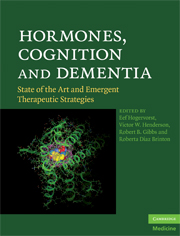Book contents
- Hormones, Cognition and Dementia
- Hormones, Cognition and Dementia
- Copyright page
- Contents
- Contributors
- Preface
- Section 1 Estrogens and cognition: perspectives and opportunities in the wake of the Women's Health Initiative Memory Study
- Section 2 Varieties of estrogenic therapy
- Section 3 Potential modulators and modifiers of estrogenic effects
- Section 4 Possible genetic factors related to hormone treatment effects
- Section 5 Testosterone, estradiol and men, and sex hormone binding globulin
- Chapter 19 Androgens and cognitive functioning in women
- Chapter 20 The role of estradiol in testosterone treatment
- Chapter 21 Endogenous testosterone levels and cognitive aging in men
- Chapter 22 Clinical trials and neuroimaging studies of testosterone in men: insights into effects on verbal memory
- Chapter 23 Testosterone therapy and Alzheimer's disease: potential for treatment and prevention in women
- Chapter 24 Endogenous estradiol and dementia in elderly men: the roles of vascular risk, sex hormone binding globulin, and aromatase activity
- Chapter 25 Testosterone regulates Alzheimer's disease pathogenesis
- Section 6 Gonadotropin effects
- Index
- Plate Section
Chapter 23 - Testosterone therapy and Alzheimer's disease: potential for treatment and prevention in women
from Section 5 - Testosterone, estradiol and men, and sex hormone binding globulin
Published online by Cambridge University Press: 06 July 2010
- Hormones, Cognition and Dementia
- Hormones, Cognition and Dementia
- Copyright page
- Contents
- Contributors
- Preface
- Section 1 Estrogens and cognition: perspectives and opportunities in the wake of the Women's Health Initiative Memory Study
- Section 2 Varieties of estrogenic therapy
- Section 3 Potential modulators and modifiers of estrogenic effects
- Section 4 Possible genetic factors related to hormone treatment effects
- Section 5 Testosterone, estradiol and men, and sex hormone binding globulin
- Chapter 19 Androgens and cognitive functioning in women
- Chapter 20 The role of estradiol in testosterone treatment
- Chapter 21 Endogenous testosterone levels and cognitive aging in men
- Chapter 22 Clinical trials and neuroimaging studies of testosterone in men: insights into effects on verbal memory
- Chapter 23 Testosterone therapy and Alzheimer's disease: potential for treatment and prevention in women
- Chapter 24 Endogenous estradiol and dementia in elderly men: the roles of vascular risk, sex hormone binding globulin, and aromatase activity
- Chapter 25 Testosterone regulates Alzheimer's disease pathogenesis
- Section 6 Gonadotropin effects
- Index
- Plate Section
Summary
Testosterone, an androgen, is viewed as a male hormone and for this reason is less studied in women than in men. In postmenopausal women, testosterone concentrations are affected by a number of factors, including age and whether a woman has undergone oophorectomy. Past hormonal exposures may also be relevant. In this chapter, Wharton, Asthana, and Gleason review research indicating that testosterone affects function of the hippocampus and other brain regions, and that testosterone has actions that might be expected to reduce Alzheimer's disease (AD) risk in women as well as men. Some studies in women suggest a relation between testosterone therapy or testosterone concentrations and performance on cognitive tasks involving visuospatial abilities. Unfortunately, few data are available on testosterone administration in women at risk for AD or with symptoms of this disorder. The authors conclude that further research is warranted on the cognitive effects of testosterone administration in older women, perhaps concurrently with estradiol and perhaps particularly in women who have experienced surgical menopause.
- Type
- Chapter
- Information
- Hormones, Cognition and DementiaState of the Art and Emergent Therapeutic Strategies, pp. 220 - 227Publisher: Cambridge University PressPrint publication year: 2009

